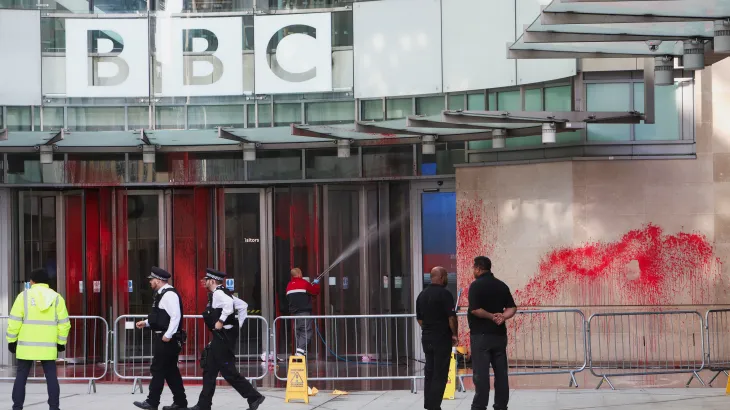The BBC has been accused by more than 100 of its staff of giving Israel favourable coverage in its reporting of the war on Gaza and criticised its lack of “accurate evidence-based journalism”.
A letter sent to the broadcaster’s director general, Tim Davie, and CEO Deborah Turness on Friday said: “Basic journalistic tenets have been lacking when it comes to holding Israel to account for its actions.”
First reported by The Independent newspaper on Friday, the signatories included more than 100 anonymous BBC staff and more than 200 from the media industry, as well as historians, actors, academics and politicians.
“The consequences of inadequate coverage are significant. Every television report, article and radio interview that has failed to robustly challenge Israeli claims has systematically dehumanised Palestinians,” the letter said.
Israel’s war on Gaza has killed at least 43,259 Palestinians and wounded 101,827 since October 7, 2023. An estimated 1,139 people were killed in Israel during the Hamas-led attacks that day and more than 200 were taken captive.
The signatories called on the BBC to implement editorial commitments including “reiterating that Israel does not give external journalists access to Gaza; making it clear when there is insufficient evidence to back up Israeli claims; making clear where Israel is the perpetrator in article headlines; including regular historical context predating October 2023; and robustly challenging Israeli government and military representatives in all interviews”.
The letter said British media organisations such as the BBC, ITV and Sky “enjoy high levels of public trust” and have a “duty to fearlessly follow the evidence”.
It also noted that the BBC “is licence fee funded, and the erosion of its own editorial standards has put its impartiality and independence at serious risk”.
Last November, more than a month after Israel began its war in Gaza, eight United Kingdom-based journalists employed by the BBC wrote a letter to Al Jazeera and said the BBC is guilty of a “double standard in how civilians are seen”, given that it is “unflinching” in its reporting of alleged Russian war crimes in Ukraine.
“This organisation doesn’t represent us,” one of the co-writers told Al Jazeera.
“For me, and definitely for other people of colour, we can see blatantly that certain civilian lives are considered more worthy than others – that there is some sort of hierarchy at play.”
Israel’s war has now expanded to Lebanon, where at least 2,897 people have been killed and 13,150 wounded in Israeli attacks since the war on Gaza began.
The BBC has defended its coverage of the war in Gaza.
According to UK media reports on Friday, a BBC spokesperson said: “When we make mistakes or have made changes to the way we report, we are transparent.
“We are also very clear with our audiences on the limitations put on our reporting – including the lack of access into Gaza and restricted access to parts of Lebanon, and our continued efforts to get reporters into those areas,” the spokesperson added.
Latest Stories
-
‘Write for World’ graduates 30 females in entrepreneurship and fashion design programme
35 minutes -
Police escort vehicle somersaults in near-fatal crash near Binduri
42 minutes -
Sir Sam Jonah commends Mahama as he backs youth leadership to transform Ghana
1 hour -
“I was a labourer in the Obuasi mines” – Sir Sam Jonah shares humble beginning
2 hours -
Embrace the ‘F word’; Failure is the path to success – Sir Sam Jonah
2 hours -
Build relationships that matter – Sir Sam Jonah advises Ghanaian youth
3 hours -
Africa doesn’t need more people with power, money or fame but character – Sir Sam Jonah
5 hours -
Celebrating Melvina Amoafo: A Legacy of excellence in Ghana’s capital market
6 hours -
Restoring Meritocracy: A path to effective governance in Ghana
6 hours -
Relief as Agavedzi Sea Defence Project officially begins
6 hours -
Engr. Kwame Adu-Mante celebrates professional milestone with IET Ghana
7 hours -
Elizabeth Amoaa’s quest to empower women, transform lives and raise voices
10 hours -
Gauff beats Sabalenka to win French Open title
10 hours -
Deputy Finance Minister urges diasporans to continue sending remittances despite cedi appreciation
10 hours -
Asante Mamponghene’s burial rites attract thousands of mourners
11 hours

